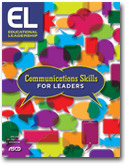Research Alert
We Have to Talk …
A parent has complained to the principal about a teacher. Now the principal must meet with the teacher to discuss the situation. How well do you think the principal will manage that conversation?
Not very well, according to recent research that looked at the effectiveness of principals when interacting with a teacher who is the subject of a parental complaint. The study found that the principals typically avoided addressing the conflict—and thereby failed to address possible instructional weaknesses—in the interest of maintaining good staff relationships.
The study rated the principals on six skills associated with successful conversational outcomes. A principal who effectively manages a difficult discussion does the following:
- Expresses a point of view grounded in examples and evidence.
- Seeks deeper understanding of the teacher's point of view.
- Checks his or her understanding of the teacher's point of view.
- Helps the teacher consider alternate points of view.
- Is open to examination of his or her own point of view.
- Agrees with the teacher on what to do next.
The study found that the principals had low-to-moderate effectiveness in their interactions with the teacher in this scenario. They tended to be strongest in presenting their own point of view, but they didn't consistently disclose the reasons for those views. They also tended to respond defensively when someone challenged their point of view. The result was limited progress in problem solving and limited agreement about next steps. Principals rated lowest on checking for understanding.
Improving teaching and learning will require a principal to engage teachers in conversations about the quality of their teaching—and these conversations can be emotionally charged. The authors suggest that school leaders would benefit from more high-quality training in this area.
The study, "The Interpersonal Challenges of Instructional Leadership: Principals' Effectiveness in Conversations About Performance Issues," looked at how 27 principals enrolled in the First-Time Principals Program in New Zealand managed a difficult conversation with a teacher. Written by Deidre M. Le Fevre and Viviane M. J. Robinson, the report is available.
Conversations about the quality of a staff member's teaching can be emotionally charged.
Numbers of Note
Superintendents: Who Are They Listening To?
79: The percentage of U.S. K–12 superintendents who regularly consider feedback from PARENTS in making decisions for their school district.
57: The percentage of U.S. K–12 superintendents who regularly consider feedback from STUDENTS in making decisions for their school district.
74: The percentage of U.S. K–12 superintendents who say that TEACHERS in their district take an active role in determining their own professional development.
Source: Gallup. (2014). Understanding perspectives on American public education: Results of a Gallup—Education Week survey of K–12 school district superintendents, survey 2. Washington, DC: Author.
Relevant Reads
Leading with Questions: How Leaders Find the Right Solutions by Knowing What to Ask by Michael J. Marquardt (Jossey-Bass, 2014)
The explosion of the Challenger space shuttle. The sinking of the Titanic. The disastrous Bay of Pigs invasion. What do these events have in common? They were caused by the failure of leaders to ask the right questions and to create a culture in which it was OK to question the status quo and admit, "I don't know."
In this book, the author examines how successful leaders do both. He contrasts questions that disempower employees (Why is this project behind schedule? Whose idea was this?) with those that empower them (How do you feel about the project so far? How would you describe the way you want this project to turn out?). By learning how to use questions effectively, leaders can not only elicit information but also encourage teamwork, build relationships, and spur innovation.
ScreenGrabs
- In the TEDx talk, "<LINK URL="http://www.ted.com/talks/simon_sinek_how_great_leaders_inspire_action?language=en">How Great Leaders Inspire Action</LINK>," Simon Sinek shakes things up from the start. "All the great inspiring leaders and organizations in the world, whether it's Apple or Martin Luther King Jr. or the Wright brothers, all think, act, and communicate the exact same way. And it's the complete opposite to everyone else." Sinek shares his simple but powerful model for inspirational leadership that all starts with asking the question, "Why?"
- "We're getting used to a new way of being alone together," says Sherry Turkle in her TED Talk, "<LINK URL="http://www.ted.com/talks/sherry_turkle_alone_together">Connected, But Alone?</LINK>" Our technologies, she notes, "give us the illusion of companionship without the demands of friendship." Turkle studies how our devices are redefining human communication—and asks us to think deeply about the kinds of connections we want to have.
PageTurner
"Don't give in to pressure to speak before you know what to say."
<ATTRIB> —Julie Peterson Combs, Sandra Harris, and Stacey Edmonson </ATTRIB>

